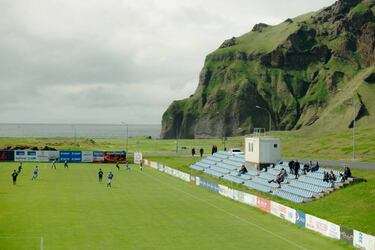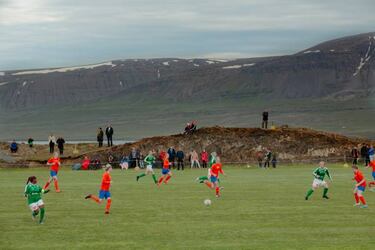Against the Elements: discovering the secrets behind Iceland's footballing success
AS English talked to Matt McGinn, author of 'Against the Elements: The Eruption of Icelandic Football' which looks at the reasons behind the Iceland football team's remarkable recent achievements.


Released this week on paperback via Pitch Publishing, Against the Elements is a fascinating account of football’s most captivating underdog story. With a population of just 350,000, Iceland stunned the sporting world when it went toe-to-toe with the elite at Euro 2016 and the 2018 World Cup.
We caught up with author of the book Matt McGinn to talk about the book and the motivation behind the initiative.
🇮🇸 OUT NOW 🇮🇸
— Against the Elements (@ATEIceland) July 27, 2020
📚 Against the Elements: The Eruption of Icelandic Football
Amazon: https://t.co/CoD38mrffw
Waterstones: https://t.co/q1VCbs0CYe pic.twitter.com/ElYNPrtucN
What was the initial inspiration for writing the book on Icelandic football?
I’d been aware that something interesting was going on in Iceland since 2013, when they lost to Croatia in a play-off to reach the World Cup in Brazil. But it was in the autumn of 2017, during an evening shift in the newsroom in Madrid, that I became really curious. The TV channel showing the various 2018 World Cup qualifiers kept returning to Turkey v Iceland, because Iceland kept scoring. It ended with a 0-3 victory which put Iceland in a strong position to become the smallest nation to qualify for the tournament. I wanted to read more about the Iceland story. As there were no books on the market, I thought I’d take the plunge and have a go myself!
It helped that my friend, Robbie Dunne, had just finished his excellent book on Rayo Vallecano. Writing a book always seemed distant, like something that other people did. Seeing Robbie go through the process and come out at the other end gave me the confidence that I could do it too.
Was Iceland's success at Euro 2016 and reaching the 2018 World Cup simply a blip when all the stars aligned or the culmination of a carefully constructed plan?
A combination of both, I think. Stakeholders in Icelandic football – led by the Icelandic FA – have made lots of very smart decisions over the last couple of decades, which have allowed Iceland to develop this reputation as a unique and intriguing hotbed of talent. I’m thinking of two decisions in particular. First, the huge programme of investment in facilities, which means artificial and indoor pitches now decorate the landscape and football can now be played throughout the year. Second, a decision to develop as many coaches as possible; Iceland now has more UEFA-stamped coaches to go around than anywhere else.
But even with the best-laid plans in place, Iceland needed the stars to align. They have benefited from a generation of talented players – with Gylfi Sigurdsson as the talisman – emerging at the same time. Iceland will always need a bit of luck to beat the big teams, but it’s amazing that they are in with a shot in the first place.
What role has geography and climate played in Icelandic football culture and have these been conditioning factors in the success of the national side?
Geography and climate have a profound effect on Icelandic culture and society. You only have to go back a couple of generations from the current crop of footballers to find people who faced a genuine, day-to-day struggle to survive in an extraordinarily harsh environment. People face a choice. They could farm infertile land which, every so often, would erupt and spew ash and lava. Or they could fish from open-deck boats in the volatile North Atlantic. Characteristics like grit and resilience remain a big part of Icelandic identity and, as footballers don’t exist in a vacuum, they are shaped by this.
I discuss these kinds of questions a lot in Against the Elements. I wanted to write a book that explored wider cultural and sociological patterns, as well as what happens on the pitch. That’s why it meanders from five days spent on a fishing trawler, to Icelandic music, to a dingy powerlifting gym. It all comes together to help explain why Icelandic football has achieved so much.

Was failure to secure an automatic Euro 2020 place considered a setback in the vision for the Icelandic FA?
Iceland still have a chance to qualify through the play-offs, so all hope is not lost. I think the Icelandic FA would take a pragmatic view and accept that it is unrealistic for Iceland to qualify for all major tournaments; just making the play-offs represents a good achievement. Then again, the ‘golden generation’ of players who have formed the core of the team for eight years are now creeping into their thirties. They won’t have many qualification campaigns in them so there is a sense that Iceland need to capitalise while they have this very settled, experienced, and cohesive unit.

Why was the model so successful and why can't similar sized European countries learn from Iceland?
Iceland produces a remarkable number of talented people across a huge variety of industries – from music to weightlifting to football, and it’s important to bear this in mind when comparing Iceland to other nations. It isn’t a matter of extracting Iceland’s approach to football and then recreating it, like a piece of flat-pack furniture in another country. That won’t work because Iceland has particular cultural and political conditions that have made the success possible.
The one thing other countries can learn from Iceland is that it is vital to create a national culture of participation in football. There are 23,000 registered footballers in Iceland, out of a total population of around 350,000. And that’s before you account for casual footballers who play but are not affiliated to a club. Once you have men, women, girls, and boys playing for enjoyment on a regular basis you can build on that in the professional game.

Why have domestic Icelandic club sides been unable to replicate the national team's success in European club competitions?
Related stories
Icelandic domestic football remains semi-professional. While clubs have done well to win qualification matches for the Europa League and reach the play-offs, none have been able to make that final step to the Group Stage. This is the aim for Icelandic football, particularly among those who believe that club football is a better barometer of Icelandic football than the performance of the national team.
The new Europa Conference League competition will create a third tier of European club competition from 2021. While this may not be great news for fans already jaded by the amount of football on offer, it will give Icelandic clubs a better opportunity to compete against – and learn from – stronger foreign opposition. Fans of smaller clubs across Europe can look forward to some stunning away days.
"Against the Elements" is available now and can be ordered via local Amazon or Book Depository websites.